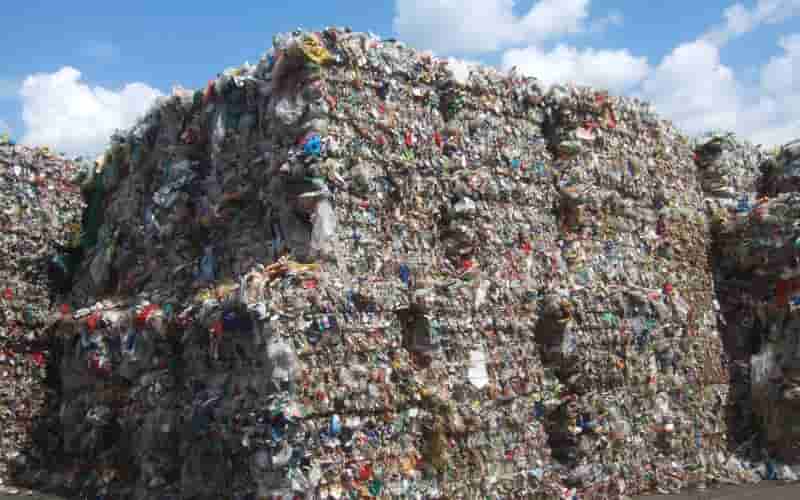This content has been archived. It may no longer be relevant
PET Tray
Crude Oil Prices Trend

Crude Oil Prices Trend by Polyestertime
Foundation Stone Laid for PET Tray Recycling Plant in Belgium
A new state-of-the-art recycling facility is set to be established in Neufchâteau, Belgium, focusing on the closed-loop recycling of PET trays and bottles. The foundation stone for the Mopet plant was laid on July 8, 2024, marking a significant step in handling opaque plastic packaging waste in Europe.
This initiative is a collaborative effort between Morssinkhof Rymoplast, Idelux, and Fost Plus. PET Tray
The plant will have the capacity to process 40,000 tonnes of PET annually, including 10,500 tonnes of trays and 17,500 tonnes of bottles, even those opaque like milk bottles. The recycled material will be suitable for producing new food-contact packaging.
Morssinkhof Rymoplast, a Dutch company, has invested 68.5 million euros in the project’s first phase, creating 90 full-time jobs. A second phase, involving an additional 45 million euros, will introduce a ‘semi-chemical’ recycling plant in the area. This facility will utilize the CuRe process for partial depolymerization of polyester waste, enabling the removal of most impurities with lower energy consumption than conventional chemical recycling methods. PET Tray
With these advancements, it is projected that by 2025, 75% of plastic packaging materials collected in Belgium will be recycled domestically. This project underscores Belgium’s commitment to sustainable waste management and the circular economy, setting a benchmark for other European countries to follow in the efficient recycling of PET packaging.

Virginia Tech researchers work to create biodegradable bioplastics from food waste
Researchers in the College of Agriculture and Life Sciences are making affordable bioplastics. PET Tray
Extraordinary amounts of energy, water, and capital are put into food systems. However, anywhere from 30 to 40 percent of the food that is produced ends up in landfills in the United States.
What if there was a way to convert it into something we use every day?
Researchers in Virginia Tech’s College of Agriculture and Life Sciences are doing just that by developing biodegradable bioplastics from food waste to give those materials a new – and useful – life. PET Tray
“By creating cost-effective bioplastics that naturally decompose, we can reduce plastic pollution on land and in oceans and address significant issues such as greenhouse gas emissions and economic losses associated with food waste,” said lead researcher Zhiwu “Drew” Wang, associate professor in the Department of Biological Systems Engineering and director of the Center for Applied Water Research and Innovation.
The project tackles the challenge of oceanic plastic pollution that is becoming even more prevalent with microplastics affecting nearly 88 percent of all marine species, according to the World Wildlife Fund. Because they can quickly biodegrade in sea water, the Virginia Tech bioplastics have the potential to reduce the effect of pollution on marine life across the globe. PET Tray
The first-of-its kind pilot project will develop and demonstrate an affordable modular bioprocessing system to produce biodegradable bioplastics from food waste.
Researchers will harness microorganisms to convert food waste into fats, which are then processed into bioplastics.
More…

SIGNUS Concludes the FIBER2FIBER Textile Project
The FIBER2FIBER project, launched in 2022 in collaboration with the GAIKER technology centre, aimed to develop a new way to take advantage of the textile fraction from tyre recycling through chemical recycling PET Tray
The management of tyres, which are mainly composed of rubber, steel and textile fibres, requires constantly investigating new ways to recycle them in different applications, since today it is not possible to incorporate all of their components in the manufacturing chain of new tyres. Thus, this project emerged with the aim of achieving the circularity of textile fibres by incorporating them back into the production chain.
Despite this great advance, the recycling of the textile fraction continues to be, today, a pending issue due to its great complexity since it is a mixture of textile fibres of different composition, such as polyesters, polyamides or rayon, and also contaminated to a greater or lesser extent by rubber particles from the process of separating the tyre components through mechanical recycling. PET Tray
In this context, chemical recycling is presented as a complementary technological solution. Due to the great complexity of the textile fibre fraction of NFVU, it is necessary to approach chemical recycling selectively, that is, focusing only on one type of textile fibre. Therefore, this project focuses on the fraction corresponding to PET-type polyester fibres.

In 2023, composite decking company Trex used around 328 million pounds of recycled polyethylene (PE), a decline from previous years
According to Trex’s 2023 Sustainability Report, “Seeing More Value in Sustainability,” the company used 421 million pounds of PE in 2021 and 409 million pounds in 2022. The Q1 2024 investor presentation revealed that residential adjusted sales peaked in 2021 at just over $1.14 billion, then dropped to $1.06 billion in 2022 and $1.1 billion in 2023.
Bryan Fairbanks, Trex president and CEO, mentioned in the Q1 2024 earnings call that 2023 ended with “historically low inventories.” Flexible film
He noted that Trex is reclaiming shelf space in stores previously occupied by smaller brands during the COVID-19 pandemic due to supply chain issues. “Accounts that took in excess products because of their suppliers’ limited capacity are now returning to trusted brands like Trex,” Fairbanks stated.
Trex, a major recycler of PE film bags, wraps, and packaging in North America, recycles nearly 100% of its production scrap. Since its inception, Trex has recycled over 5 billion pounds of plastic film. Fairbanks emphasized the brand’s commitment to sustainability, quality, and innovation, highlighting accomplishments in the latest report and the ongoing use of recycled materials. Flexible film
The company’s PE sourcing program, NexTrex, focuses on community sources, collecting over 3 million pounds of PE from municipalities, nonprofits, small businesses, and schools in 2023. Trex is also developing strategies to recover end-of-life decking materials from various locations. Based in Virginia, Trex operates a manufacturing facility in Nevada and is constructing another in Arkansas, expected to open in 2026.

China’s BYD is set to acquire a 20% stake in Rever Automotive, its local distributor in Thailand, which stands as BYD’s largest market outside China
As a leading player in the electric vehicle (EV) market, BYD aims to strengthen its position through this acquisition, the companies announced on Saturday.
The Shenzhen-based automaker recently inaugurated its first factory in Southeast Asia, located in Thailand. This US$490 million (RM2.31 billion) facility boasts an annual manufacturing capacity of 150,000 vehicles and will provide employment for 10,000 workers. PET Tray
Rever Automotive, which operates over 100 showrooms across Thailand, began selling BYD vehicles in 2022. BYD quickly rose to become the top-selling EV brand in the country.
Liu Xueliang, BYD’s Asia-Pacific auto sales general manager, expressed enthusiasm about the deepened partnership, stating, “We are thrilled to deepen our partnership to accelerate the adoption of EVs and contribute to Thailand’s transition towards a more sustainable future.” PET Tray
Thailand, a key regional hub for auto assembly and export, has traditionally been dominated by Japanese automakers such as Toyota Motor, Honda Motor Co, and Isuzu Motors. In the first quarter of 2024, BYD captured a 46% share of Thailand’s EV market and ranked as the third-largest player in the passenger car segment, according to research firm Counterpoint.

EU chemical industry is making slow strides forward
The overall chemicals business climate appears to be more stable: Managers’ opinion on order books is slightly up, but still reflects limited demand, and while uncertainty about their future business situation decreased in retail trade and services, it remained stable in industry and construction. PET Tray
It also seems the EU27 chemical industry has moved beyond its ultimate low in terms of output and capacity utilisation, and is finally showing a positive trend: Output in Q1-2024 was 1.8% higher than in Q4-2023, and there was a small increase of capacity utilisation in the EU27 chemical industry from 74.4% in Q3-2023 to 75.5% in Q1-2024, staying well below the long-term average of 81.4%. PET Tray
In Q1 2024, the EU27 chemicals trade surplus reached the highest value since Q1 2022 (€14.8 bn). The EU27 chemicals exports to non-EU27 area increased by €5.6 bn from Q4-2023 to Q1-2024. The country analysis shows that USA and UK contributed largely to this positive development.
More…

Flexible film – A new process separates mixed textile waste for recycling 08-07-2024
PET Tray







